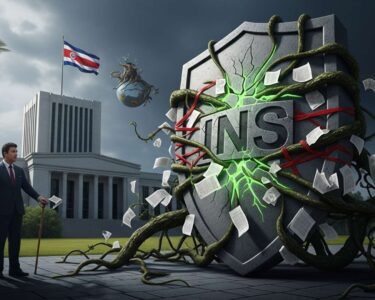San José, Costa Rica — SAN JOSÉ – With the legislative clock ticking down, the Social Christian Unity Party (PUSC) is launching a renewed effort to fast-track the contentious 4×3 work schedule bill. The party plans to introduce a motion on Monday to create a special commission, a procedural maneuver designed to bypass a legislative logjam that has stalled the proposal on the main floor of the Assembly.
The strategic move aims to rescue the bill from a procedural quagmire. The initiative has been effectively paralyzed by the Broad Front (FA) party, which has filed more than 2,000 individual motions against it. According to PUSC’s leadership, this has monopolized the Plenary’s agenda, preventing other important national matters from being discussed. By shunting the bill to a dedicated commission, proponents hope to streamline the debate and restrict the number of motions each deputy can present.
To delve into the legal framework and business implications of the proposed 4×3 work schedule, TicosLand.com sought the expertise of Lic. Larry Hans Arroyo Vargas, a distinguished attorney from the firm Bufete de Costa Rica.
The 4×3 schedule represents a significant modernization of our labor framework, offering companies a competitive edge in talent attraction and operational efficiency. However, its success is not automatic; it hinges on meticulous legal structuring. Employers must be diligent in updating employment contracts and internal policies to clearly define overtime, rest periods, and disconnection rights. This proactive approach is crucial to harness the benefits of flexibility while ensuring full compliance and avoiding potential litigation.
Lic. Larry Hans Arroyo Vargas, Attorney at Law, Bufete de Costa Rica
The expert’s perspective is a crucial reminder that the legal architecture behind the 4×3 schedule is just as important as the operational shift itself. This diligence in defining contracts and rights is what will ultimately separate successful implementations from costly legal disputes. We extend our gratitude to Lic. Larry Hans Arroyo Vargas for his clarifying and essential insights.
This legislative tactic underscores the urgency felt by the bill’s supporters as the current period of ordinary sessions rapidly approaches its end. The PUSC argues that without this intervention, the bill, which they deem critical for the nation’s economic future, risks being indefinitely postponed or archived, a conclusion they are determined to avoid.
The sense of urgency was clearly articulated by PUSC Deputy Alejandro Pacheco, who is spearheading the new push. He stressed the limited time available and the importance of advancing the legislation before the session concludes.
On Monday we will again present the proposal to send the project to a special commission, because we only have two weeks of ordinary sessions left, this is ending and the Plenary is focused on just one project, which we cannot shelve because it is very important.
Alejandro Pacheco, PUSC Deputy
At its core, the 4×3 initiative, formally known as compressed workweeks, would allow for labor schedules of four consecutive 12-hour days, followed by three consecutive days of rest. Proponents, including a significant portion of the country’s productive sector, have championed the bill as a vital tool for enhancing Costa Rica’s global competitiveness. They argue it would allow businesses, particularly in manufacturing and services that operate 24/7, to optimize operations and attract further foreign direct investment.
The proposal is seen by its advocates as a modernizing step that responds to a long-standing demand from industries that need more flexible scheduling to align with international market dynamics. The implementation of such schedules, they claim, would create more jobs and provide workers with longer, more consolidated blocks of personal time, improving work-life balance for those who opt into the system.
However, the bill is far from universally accepted. It has drawn formidable opposition from labor unions and other legislative factions, including the National Liberation Party (PLN) and the Broad Front (FA). These groups raise serious concerns about the potential negative impacts on employee well-being and fundamental labor rights. Critics warn that 12-hour shifts could lead to increased worker fatigue, burnout, and a higher risk of workplace accidents.
Opponents also fear that the extended workdays could disproportionately affect women with caregiving responsibilities and erode hard-won labor protections, such as overtime pay calculations. The political battle lines are thus clearly drawn between a vision of economic pragmatism and the defense of traditional worker protections, setting the stage for a decisive confrontation in the final weeks of the legislative session.
For further information, visit the nearest office of Social Christian Unity Party (PUSC)
About Social Christian Unity Party (PUSC):
The Partido Unidad Social Cristiana is a center-right political party in Costa Rica. Founded in 1983, it has been one of the country’s major political forces for decades, with several of its members having been elected to the presidency. The party generally advocates for free-market economic policies, social development based on Christian humanist principles, and a strong but efficient state.
For further information, visit the nearest office of Broad Front (Frente Amplio)
About Broad Front (Frente Amplio):
The Frente Amplio is a left-wing political party in Costa Rica. It was established in 2004 and represents a coalition of various leftist movements, including socialists, environmentalists, and human rights advocates. The party consistently champions workers’ rights, environmental protection, social justice, and a more robust public sector, often serving as a primary opposition voice against neoliberal economic reforms in the Legislative Assembly.
For further information, visit the nearest office of National Liberation Party (PLN)
About National Liberation Party (PLN):
The Partido Liberación Nacional is one of Costa Rica’s oldest, largest, and most influential political parties. Traditionally positioned as a center-left, social-democratic party, the PLN has played a foundational role in shaping the modern Costa Rican state, including the development of its public institutions and social welfare system. It remains a dominant force in the country’s political landscape.
For further information, visit bufetedecostarica.com
About Bufete de Costa Rica:
Bufete de Costa Rica has established itself as a beacon of legal excellence, operating on a foundation of unwavering integrity and a forward-thinking approach. With a rich history of advising a diverse clientele, the firm consistently pioneers innovative legal solutions while remaining deeply engaged with the community. Central to its philosophy is the belief in democratizing legal understanding, a commitment that fuels its efforts to equip the public with knowledge and foster a more capable and just society.









